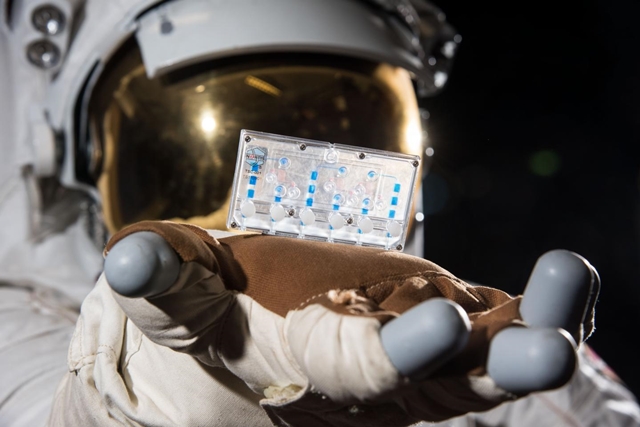23 Apr. 2019. A collection of 4 new tissue chip experiments are among the payloads to be sent next week to the International Space Station or ISS. The experiments are scheduled for launch aboard the 17th commercial resupply mission on a SpaceX Dragon spacecraft on Tuesday, 30 April, from Cape Canaveral, Florida.
Tissue chips are samples of human cells and tissue housed in clear plastic, with micro-fine channels simulating living functions. The experiments about the space station aim to gauge effects of microgravity or weightlessness on these tissue samples, where the earth’s gravity may prevent or impair their functions. The Tissue Chip in Space program is a joint project of the ISS National Laboratory and National Center for Advancing Translational Sciences, part of National Institutes of Health.
Among the tissue chips in next week’s launch is an experiment designed by drug maker AstraZeneca testing drugs formulated as nanoscale particles, where 1 nanometer equals 1 billionth of a meter. Nanoparticle drug formulations are often considered desirable for targeted treatments of those released over an extended period of time. The nanoparticle chip on the ISS is expected to test effects of microgravity on different particle sizes and distributions, to gauge their implications for producing drugs of this kind.
A second experiment is testing effects of microgravity on a chip simulating the blood-brain barrier. The blood-brain barrier prevents molecules from crossing from the blood stream into brain cells. Blood vessels in the brain form a support network for brain functions, with tightly-packed cells lining blood vessels that allow nutrients like glucose to pass through, but keeping out foreign substances. This barrier also keeps out drugs to treat neurological conditions, such as Parkinson’s or Alzheimer’s disease, and its impaired functioning is also implicated in these disorders. The experiment seeks to validate operations of the chip, developed by the Wyss Institute at Harvard University and licensed to spin-off company Emulate Inc. in Boston.
Another chip contains a model of cartilage, bone, and synovium tissue found in joints. This chip, designed by a team at Massachusetts Institute of Technology, is testing effects of microgravity on these types of tissue as an indicator of osteoarthritis and bone loss from trauma and aging. Data from the tests are also expected to help improve understanding of exercise-related injuries suffered by astronauts. This tissue chip is designed as well to track release of inflammatory proteins in the synovial lining membrane that contribute to joint injuries.
Still another chip in the payload aims to test the ability of protein crystals to grow in microgravity, designed with National Cancer Institute. The protein in this case is Taspase1, a promising target of cancer therapies, as well as a related protein from a mutation of the gene expressing Taspase1. The tests aim to produce higher-quality protein crystals in microgravity than can be grown in Earth’s gravity, which often show a high degree of imperfection. Findings from the tests will be analyzed at Arizona State University by an academic chemical-biology consortium.
Science & Enterprise reported on the first set of tissue chips sent to the ISS on the station’s 16th resupply mission in December 2018. The following video tells more about experiments aboard the new launch next week.
- Univ-Business Consortium Developing Advanced Satellites
- Infographic – Countries with Most Space Satellites
- Chip Device to Test Gut Infections on Space Station
- NASA Boosts 3-D Printing, Lasers in Space Manufacturing
- Infographic — International Space Station Crew Members
* * *


 RSS - Posts
RSS - Posts
[…] for targeted treatments and drugs released over an extended period of time. In a recent story, Science & Enterprise described experiments sponsored by drug maker AstraZeneca sent to the International Space Station […]
[…] Tissue Chip Experiments Set for Space Station […]